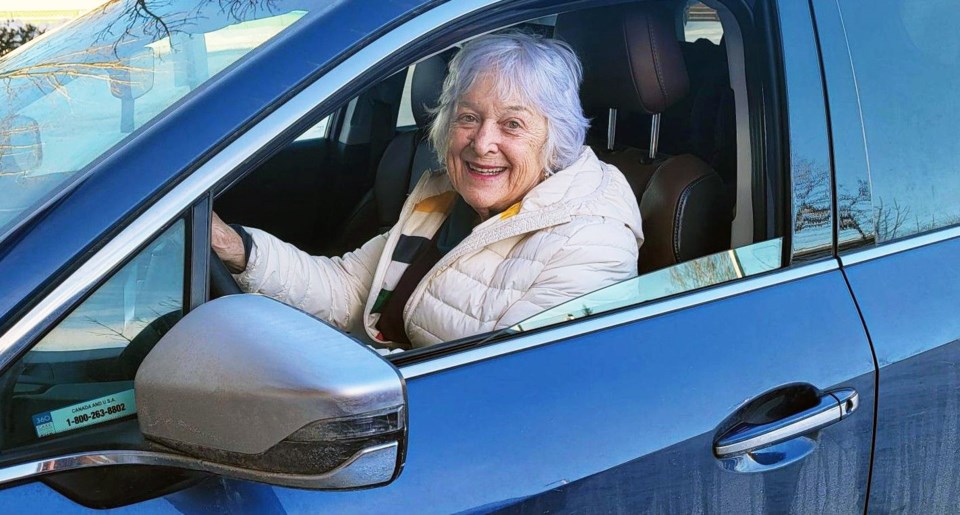Cancer is expensive.
Not only are you dealing with a serious health crisis but on top of that the average BCer spends $33,000 in their lifetime after diagnosis.
“That’s $33,000 out of pocket and that’s huge,” Carolyn Knox, Senior Director for Access to Care, Canadian Cancer Society, said.
To help with the financial burden, the BC government expanded its Cancer Travel and Accommodation Services program and that’s good news for people who must leave home and stay elsewhere for treatment.
“This program tries to alleviate that financial toxicity as much as we can,” Knox said. “So we provide travel grants for people who have to leave their own communities for cancer treatment. We also have the Wheels of Hope Program in communities and surrounding areas where volunteer drivers use fleet vehicles and sometimes volunteers use their own vehicles, to get people to treatment.
Shirley Campbell uses her own car as a volunteer driver for the Wheels of Hope program.
Campbell had just returned from dropping off a cancer patient at a appointment in town when The Citizen caught up with her.
“It’s nice to be able to help people – the lady I just dropped off has come from Kitimat for her cancer treatment,” Campbell said. “It’s nice to chat with people and get to know their story. They’re just lovely and they’re going through a tough time. So I just try to do anything I can to try to make it easier for them. I try to be uplifting and everyone is so grateful.”
Campbell has been volunteering for the last four years and was inspired to start when her friends in Squamish told her they were volunteering in the same way.
“That’s how I heard about it and I thought ‘well, I’ve got some free time and I like to drive so maybe I’ll try it’ so I did and I really enjoy it.”
Mostly it’s short trips around the city but every now and again journeys are a little longer.
Prince George residents living in the outlying areas need rides, too. So when Campbell volunteers to assist patients living nearby it could be an hour-long round trip from town to where the patient lives and then another round trip after the appointment later in the day.
“When people ask me why I volunteer I always say people are always good to me so this is a way I can pay it forward,” Campbell said, talking about neighbours who shovel her driveway at 6:30 in the morning or look after her dog when she goes away.
Campbell moved to Prince George about eight years ago to be closer to family.
“People have always been very friendly and welcoming here,” she said. “And I like driving – I even drive the grandkids – so this is a good volunteer job for me.”
Campbell usually volunteers Tuesdays and Thursdays to work around her schedule and she can volunteer as much or as little as she’d like.
Campbell knows she can get reimbursed for her mileage as part of her volunteer duties but she chooses to donate it back to the Canadian Cancer Society.
She said it’s very rewarding knowing she’s helping with what could be a rather stressful situation. Most patients are coming from out of town and have no vehicle of their own and trying to find their way around town can take its toll.
And that’s why Campbell volunteers. She knows people are already struggling with their illness.
“I just want to make it easier for them to get to where they need to go,” Campbell said. “And when I hear their stories they also tell me how grateful they are for the treatment centre.”
The Kordyban Lodge in Prince George is a perfect example of how people getting treatment can get a financial break. Patients stay free and get a home-like atmosphere and meals, too.
“We now provide free accommodation and meals at the lodges for cancer patients,” Knox said.
“It used to be $55 a day and now it’s free and it’s made a huge difference.”
In 2024 there were 26,700 nights of free accommodation provided at Canadian Cancer Society lodges.
“And we’re very proud of that and at the same time it’s a drop in the bucket,” Knox said. “We’re here to help everyone so please don’t hesitate to reach out.”
Here’s how the Canadian Cancer Society supports people with cancer:
- Financial assistance: Grants for travel expenses related to cancer care, including for those who need to travel or temporarily relocate for leukemia/bone marrow transplant
- Accommodations: Free lodging and meals at no cost to the patients at one of the CCS lodges near treatment centres
- Ground transportation: Through the Wheels of Hope program that connect patients needing free transportation to medical centres with volunteer drivers
In addition, Hope Air provides free flights for those who need to travel by air for their appointments.
Along with the financial assistance people can access services like the Cancer Information Helpline that’s toll free at 1-888-939-3333 and provides specific information about different types of cancer, what to expect from treatment and also offers emotional support. There is also a community services locator that sees a full data base for every community.
There is a program called Cancer Connection, which is an online community to connect, learn and share stories with people with similar experiences with cancer. Access the service by visiting www.cancerconnection.ca/s/.
For more information about all the programs available for cancer patients visit https://cancer.ca/en/living-with-cancer/how-we-can-help.

.png;w=120;h=80;mode=crop)

